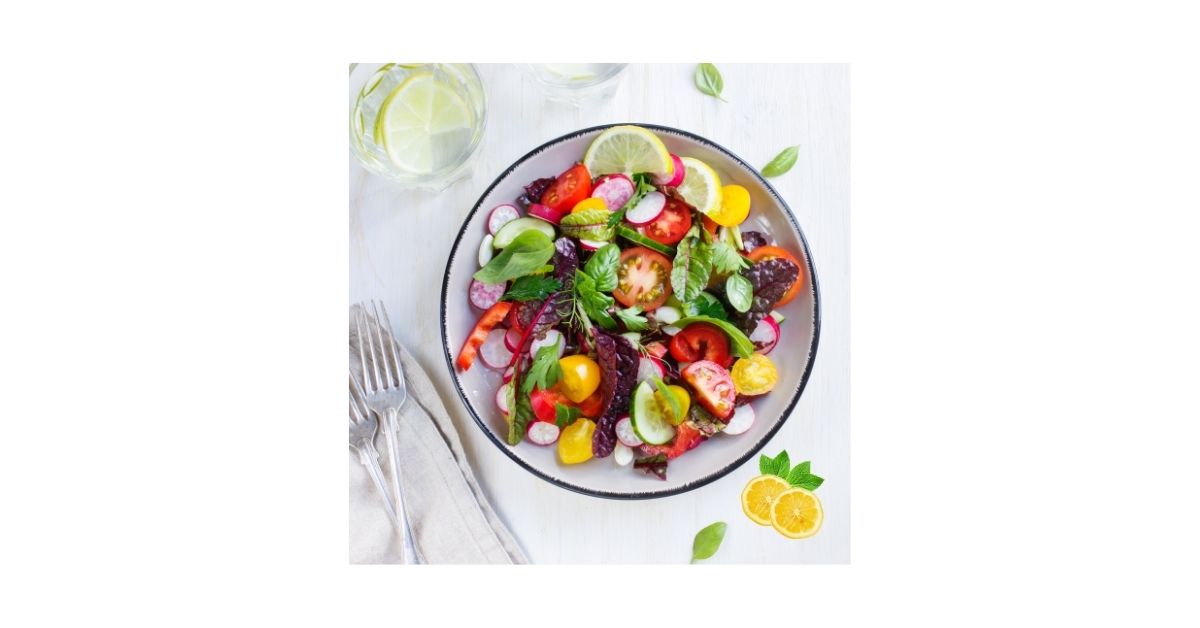Avoid bloating in hot weather by adding healthy and nutrient-rich foods. Fresh fruits, veggies, whole grains, and staying hydrated may improve digestion naturally.
Bloating is frequently caused by gas, constipation, or eating heavy meals. What you eat and drink can significantly affect bloating and other digestive issues. Making small changes to your diet can help reduce and avoid bloating.
22 foods and drinks to avoid bloating in hot weather

A list of gut-friendly fruits, vegetables, whole grains, and beverages can help you avoid bloating in hot weather.
1. Cucumber
Cucumbers are made of about 95% water. They hydrate your body and help flush out excess sodium.
Cucumbers also contain quercetin, an antioxidant that reduces inflammation and puffiness.
Cucumbers may also help relieve irritable bowel syndrome (IBS) symptoms, such as bloating, abdominal pain, and diarrhea.
2. Bananas
Bananas are rich in potassium, a key mineral that helps balance sodium levels and reduce water retention. It is a common cause of bloating, especially in hot weather.
They also contain resistant starch and fiber, which feed the good bacteria in your gut and support regular bowel movements.
Studies show that bananas increase healthy gut bacteria and help improve digestion, which can relieve bloating.
3. Avocados
Avocados are rich in fiber, potassium, and healthy fats. Half an avocado gives you a good amount of folate, vitamin K, and vitamin C, which support digestion and reduce inflammation.
According to the USDA, one avocado contains about 10 grams of fiber. This prevents constipation and reduces bloating.
Plus, the potassium in avocados helps flush out extra sodium, lowering water retention, a common cause of bloating in hot weather.
A 2021 study in Nutrients found that high-potassium foods reduce bloating caused by excess sodium.
4. Oranges
Oranges are juicy, fiber-rich fruits packed with vitamin C and antioxidants.
Their high water content supports digestion and keeps the body well hydrated.
Rich in water and fiber, these citrus fruits help flush out excess salt, promote regular bowel movement, improve digestion, and reduce the chance of bloating.
However, experts recommend adding fiber-rich foods to your diet slowly and gradually, as increasing fiber too quickly can cause bloating.
5. Yogurt
Yogurt is a powerful probiotic food. It is full of good bacteria that keep your gut healthy.
These probiotics can improve digestion, reduce gas, and help improve stool frequency and consistency.
Yogurt also provides calcium, vitamin B12, and protein, which support gut lining and muscle function.
6. Pineapple
Pineapple contains bromelain, a digestive enzyme that helps break down proteins and reduce stomach bloating.
It is also rich in vitamin C and antioxidants that fight inflammation in the gut.
Eating fresh pineapple in hot weather can help avoid bloating by improving digestion and preventing gas buildup.
For example, studies show that bromelain may reduce inflammation, support protein digestion, and alleviate bloating and gas symptoms.
7. Berries
Strawberries, blueberries, and raspberries are high in fiber, minerals, vitamin C, and antioxidants. They are highly regarded as flavorful and healthy fruits. They’re also low in sugar and calories, ideal for summer snacking.
The polyphenols in berries help reduce inflammation in the gut, support good bacteria, improve digestion, and also help relieve IBS symptoms. They also help avoid bloating in hot weather.
8. Celery
Celery is another water-rich food, with nearly 95% water content.
It keeps you hydrated and reduces water retention. It also contains apigenin, a plant compound with anti-inflammatory effects.
Celery’s fiber and natural diuretic properties help flush out waste and gas.
According to a 2022 review, apigenin, abundant in celery, helps reduce inflammation. It also supports a balanced gut microbiome, a key for easing bloating.
9. Papaya
Papaya is known for its smooth and creamy texture. It is packed with papain, a natural enzyme that helps break down protein and support smooth digestion.
Papaya is a gut health powerhouse. It also contains fiber, vitamin C, and antioxidants, which can help avoid bloating in hot weather.
Eating papaya can help relieve gas and reduce stomach discomfort, especially after a heavy meal.
According to recent research, papaya’s papain enzyme and fiber help ease bloating and support better digestive flow.
10. Oats
Oats are rich in soluble fiber, especially beta-glucan, which forms a gel-like substance in the gut. This slows digestion, prevents gas buildup, and supports regularity.
They also help stabilize blood sugar and reduce cravings, which can support smooth digestion and help prevent bloating.
11. Turmeric
Turmeric is known for its powerful anti-inflammatory compound called curcumin.
It helps calm the digestive tract and may reduce bloating caused by inflammation or poor digestion.
It also supports liver function, which helps the body process and remove waste more efficiently.A study shows that curcumin helps reduce symptoms of IBS, including bloating, constipation, and gas.
12. Quinoa
Quinoa is a gluten-free whole grain rich in fiber, protein, and magnesium.
Unlike refined grains, quinoa is gentle on sensitive stomachs and easily digestible. It is also easier to digest for people who feel bloated, gassy, or heavy after eating wheat-based foods like pasta or crackers.
The fiber in quinoa helps regulate bowel movements and prevent constipation — one of the main causes of bloating in summer.
A 2021 study suggests that quinoa has prebiotic properties that support good gut bacteria and help improve digestion and reduce bloating naturally.
13. Rhubarb
Rhubarb contains sennosides, natural compounds that have a mild laxative effect.
It helps relieve chronic constipation and improves overall digestive function.
It’s also rich in polyphenols, which support gut health and reduce inflammation.
14. Kiwi
Kiwi is a nutrient-rich fruit known for its tart-sweet flavor and digestive benefits.
It contains a natural enzyme called actinidin, which helps digest protein-rich foods and reduce bloating.
It’s also high in vitamin C, fiber, and antioxidants, which help regulate digestion and support gut health.
15. Asparagus
Asparagus is a natural diuretic, helping your body flush out excess fluid and sodium. This reduces puffiness and bloating.
It’s also rich in prebiotic fiber like inulin, which improves gut bacteria and supports digestive health.
According to a review in EatingWell, asparagus contains prebiotics and potassium that support a healthy gut and help reduce bloating by improving digestion and balancing fluid levels.
16. Spinach
Spinach is a leafy green vegetable rich in magnesium, iron, fiber, and vitamins A and K.
Some studies indicate that spinach may increase beneficial bacteria, such as Lactobacillus, that support regular digestion and reduce bloating.
Its high fiber content also helps flush out toxins and reduce gas buildup, which can cause bloating in the heat.
17. Tomatoes
Tomatoes are juicy, slightly tangy fruits and are made up of over 90% water.
They’re high in water, fiber, and antioxidants, which help flush out excess sodium and support digestion.
They are also rich in lycopene, vitamin C, and potassium, which reduce inflammation and water retention, easing bloating.
18. Broccoli
Broccoli is a crunchy vegetable from the cruciferous family.
It is rich in fiber, vitamin C, and sulforaphane, a compound known for its detoxifying effects.
While it can cause gas for some, taking a moderate amount of broccoli can help prevent constipation and improve gut health.
A 2022 study indicates that eating broccoli regularly helps improve gut barrier function, which can reduce bloating over time.
19. Fennel
Fennel is known for its sweet, licorice-like flavor and is often used in cooking and herbal remedies.
Its seeds are a natural digestive aid that may help relieve bloating, gas, and stomach cramps.
Fennel contains antispasmodic compounds like anethole that help relax muscles in the intestines, reducing bloating and promoting smoother digestion.
It also provides fiber, potassium, and vitamin C, which support gut health and reduce inflammation.
Beverages To Avoid Bloating In Hot Weather

20. Green Tea
Green tea is a refreshing herbal beverage with a mild, earthy taste.
It’s packed with antioxidants like EGCG, which help reduce gut inflammation and oxidative stress.
These antioxidants may ease symptoms of inflammatory bowel conditions, support metabolism, and help prevent water retention.
The small amount of caffeine in green tea also helps stimulate digestion and reduce bloating in hot weather.
21. Pappermint Tea
Peppermint tea is made from fresh mint leaves and is often enjoyed after meals. This caffeine‑free herbal tea is widely used to reduce bloating, gas, and indigestion.
It contains menthol and menthone, which act as antispasmodics—relaxing muscles in your intestines and helping gas pass more easily. This can bring quick relief from discomfort, bloating, and cramping.
A clinical study found that peppermint oil significantly reduced bloating and other IBS symptoms.
It also has mild antibacterial and anti-inflammatory properties, and may freshen breath and soothe stomach cramps.
22. Ginger Tea
Ginger tea is a natural remedy for gas, indigestion, and bloating. It contains gingerol, a compound that stimulates digestion and reduces inflammation in the stomach lining.
A 2020 clinical review highlights ginger’s ability to reduce bloating, nausea, and other gastrointestinal (GI) symptoms.
Simple Habits To Help Avoid Bloating In Hot Weather
Make your summer days more cheerful and comfortable by following these simple habits to reduce bloating. Let’s give them a try!
- Drink water regularly
- Avoid talking while eating
- Walk and exercise regularly
- Use smaller portions
- Eat slowly and chew food thoroughly
- Avoid eating late at night
- Go for light walks after meals
- Wear loose and breathable clothing
- Reduce stress through deep breathing or meditation
- Limit screen time during meals to focus on mindful eating
What To Eat To Avoid Bloating In Hot Weather
Some foods and beverages can cause excess gas, especially during hot weather.
Limiting the following may help reduce belly discomfort:
- Carbonated drinks, Fizzy drinks like soda or sparkling water
- Fried and Spicy foods
- Processed and packaged Foods, such as chips, instant noodles, and frozen meals
- Dairy products, such as milk, ice cream, and cheese (if lactose intolerant)
- Legumes, such as beans, lentils, and chickpeas (when eaten in large quantities)
- High-fiber foods, such as bran, cabbage, and broccoli (if added too quickly to the diet)
Top Causes And How To Avoid Bloating In Hot Weather
It’s also important to know what causes bloating in hot weather — and the best ways to prevent it naturally.
- Keep sipping water throughout the day, especially if you’re sweating more.
- Let cold foods come to room temperature slightly, and eat slowly.
- Add natural electrolytes like coconut water, bananas, or a pinch of salt to lemon water.
- Eat small, regular meals even if your appetite feels low.
- Some foods, like cabbage, beans, or onions may be harder to digest in hot weather. Eat these in moderation and combine them with gut-friendly herbs like cumin or ginger.
- Hot weather can make you lazy, reducing physical movement and slowing digestion. Go for short indoor walks or stretch lightly after meals.
- Try relaxation techniques like yoga, prayer, or short breathing exercises.
Conclusion
Bloating in hot weather is often caused by dehydration, poor digestion, and water retention. Choosing the right foods—rich in fiber, water, enzymes, and anti-inflammatory compounds can support gut health and naturally ease discomfort.
Incorporate these healthy foods into your daily diet to help avoid bloating in hot weather and support a healthier digestive system. For more wellness tips and easy recipes, visit healthfullcircle.com
This article is for educational and informational purposes only, not a substitute for professional medical advice. Always consult your physician before making any dietary changes, especially if you have any health conditions, food sensitivities, allergies, or are taking medications.



